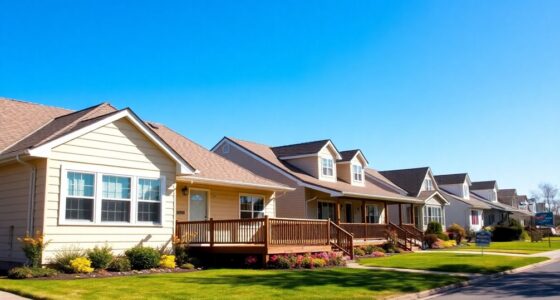Choosing between a bungalow and a two-storey house hinges on your priorities. Bungalows offer single-level living, making them safer and easier to navigate, especially for families with young kids or aging relatives. They also typically have lower construction and maintenance costs. However, if you value privacy and space separation for a larger family, a two-storey home could be a better fit. It may provide creative design options and room for future expansion. Ultimately, your choice depends on your lifestyle, budget, and family needs, and exploring these themes can help refine your decision.
Key Takeaways
- Bungalows offer lower construction and maintenance costs, while two-storey homes may incur higher expenses due to complexity and accessibility modifications.
- Two-storey homes provide better privacy through separation of living and sleeping areas, making them ideal for larger families.
- Bungalows facilitate easier mobility and accessibility, especially for aging residents, while two-storey homes may require costly modifications for accessibility.
- Bungalows allow for more flexible and affordable home expansions, whereas two-storey homes often complicate renovations due to structural constraints.
- Bungalows typically feature open concept designs, promoting togetherness, while two-storey homes offer varied architectural styles and privacy through layout separation.
Lot Size and Land Tax
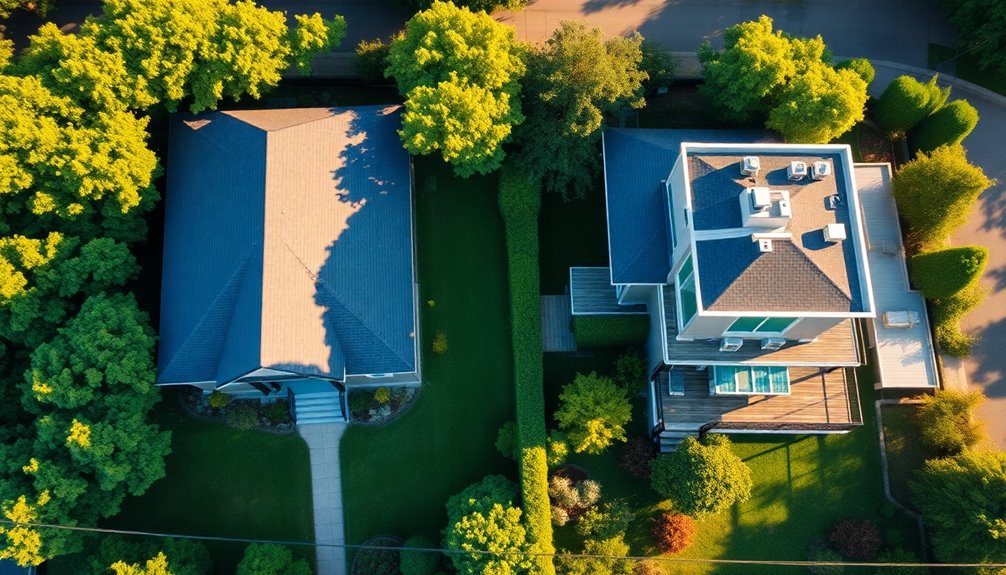
When it comes to lot size and land tax, the differences between bungalows and two-storey houses are significant.
A bungalow house typically requires a larger plot of land, which can lead to higher land tax expenses due to its expansive single-level layout.
In contrast, two-storey homes efficiently maximize living space on smaller plots, reducing your land tax obligations.
The larger footprint of a bungalow means you'll face increased tax responsibilities directly linked to the size of the land.
If you're considering future home expansions, a two-storey design could be more tax-efficient, allowing you to utilize vertical space instead of spreading horizontally.
Ultimately, the choice between a bungalow and a two-storey house can greatly impact your financial responsibilities.
Privacy Considerations

When it comes to privacy, your family's size plays a big role in choosing between a bungalow and a two-storey home.
Larger families often prefer two-storey layouts that separate sleeping areas from living spaces, giving everyone a little more personal space.
On the other hand, bungalows can still offer privacy through thoughtful landscaping, helping you create a cozy retreat right in your yard.
Family Size Impact
Although family size greatly influences housing choices, the layout of a home can substantially affect privacy. For larger families, a two-story home is often more suitable as it provides distinct living and sleeping areas. This separation enhances privacy, allowing family members to enjoy their personal space away from common areas. Bungalows, with their single-level layout, can limit privacy due to shared spaces, making them less ideal for bigger households.
| Aspect | Two-Story Home |
|---|---|
| Floor Separation | Increased privacy |
| Bedroom Location | Away from common areas |
| Window Coverings | Shields views |
| Space Utilization | Defined zones |
| Ideal For | Larger families |
Choosing the right layout can greatly impact your family's comfort and privacy.
Landscaping for Privacy
To enhance privacy in your home, effective landscaping can make a significant difference. In a bungalow, you can create natural barriers using strategically placed plants, trees, and fences, which limit visibility from the street and neighboring properties.
This is especially beneficial for those with limited mobility, as single-story designs provide easy access to these landscaping features.
On the other hand, if you opt for a two-storey house, consider using window coverings and landscaping to shield upper-floor windows.
This separation can enhance privacy for bedrooms, keeping them quieter and more secluded.
Additionally, incorporating fragrant plants can provide both aromatherapy benefits and enhance the overall atmosphere of your outdoor space.
Ultimately, whether you choose a bungalow or a two-storey home, prioritize landscaping that meets your privacy needs for a more comfortable living environment.
Home Expansion Options
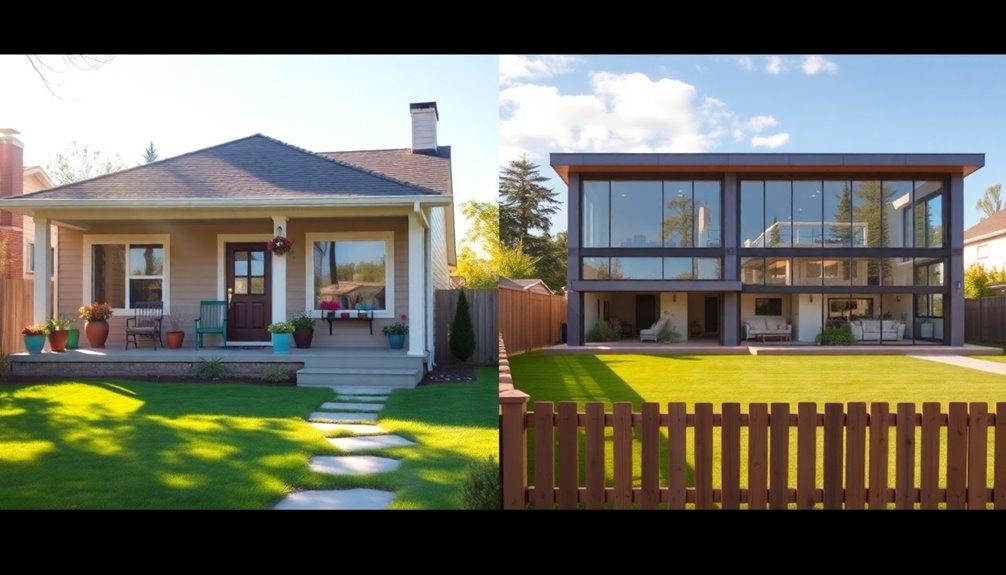
Home expansion options can considerably impact how well a house meets your family's needs over time.
If you own a bungalow, you can quickly and affordably expand outward, making it a great choice for families needing extra space without major structural changes.
However, if you have a two-storey home, you might consider adding a second floor, which can preserve your yard but requires more time, cost, and careful planning.
It's crucial to think about the design of your custom home; bungalows offer more flexibility for outward modifications, while two-story homes could face limitations due to existing roof structures.
Ultimately, your choice should reflect your long-term expansion needs and lifestyle preferences.
Repair and Renovation Costs
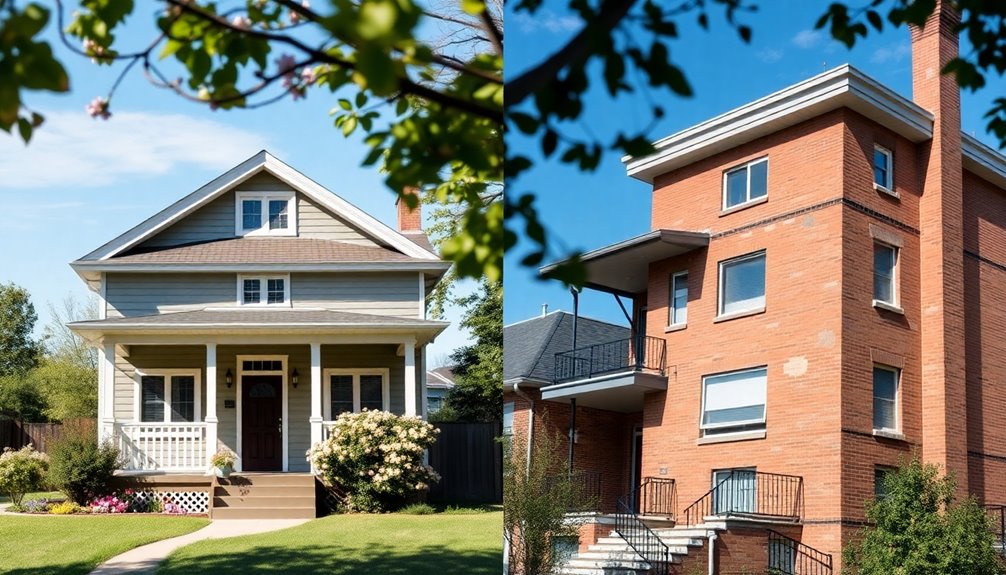
When considering repair and renovation costs, it's essential to recognize the differences between bungalows and two-storey homes.
Bungalows generally have larger roof areas, which can lead to higher exterior repair costs. However, their interior remodels are often more cost-efficient since they require less complex structural changes compared to two-storey homes.
Repairs in two-storey houses can be more complicated and pricey, often needing specialized labor due to the multiple floors. Expanding a bungalow outward is usually quicker and cheaper than adding a second story to a two-storey home, which demands significant structural reinforcement.
Utility Expense Analysis
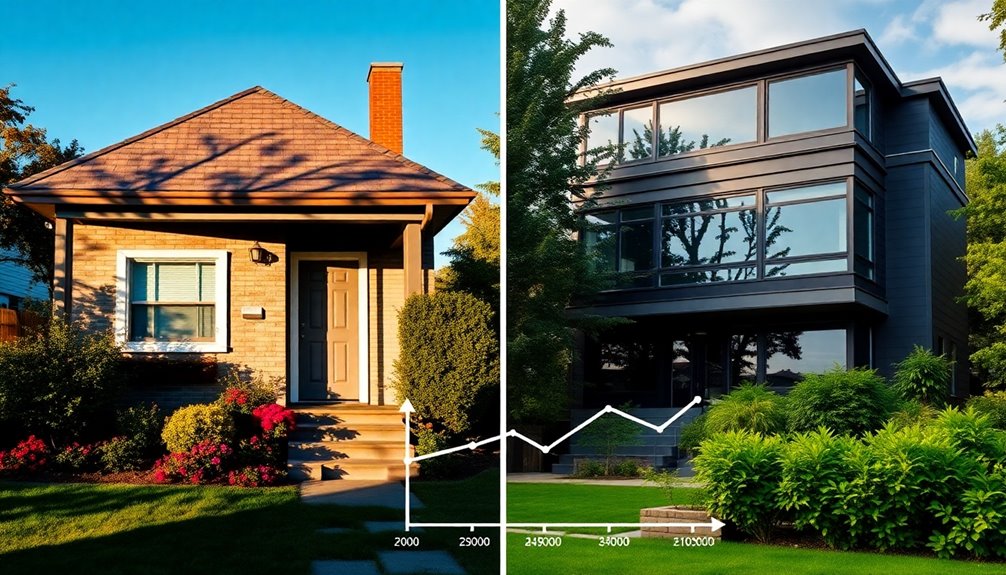
When it comes to utility expenses, you'll want to contemplate how energy efficiency, size, and layout impact your costs.
Bungalows often provide a more efficient design for heating and cooling, while two-story homes can lead to higher bills if not managed well.
Understanding these factors can help you make an informed decision about long-term utility costs.
Energy Efficiency Considerations
Choosing between a bungalow and a two-storey house often boils down to energy efficiency, especially regarding utility costs.
Bungalows typically have lower utility expenses due to their interconnected room designs, allowing for more efficient heating and cooling.
On the other hand, two-storey homes usually incur higher energy costs since they require more energy to manage multiple levels, particularly if HVAC systems aren't designed well.
While the smaller roof area of two-storey houses can reduce heating costs by limiting heat loss, bungalows may have larger roof areas that can increase expenses in colder climates.
Ultimately, energy-efficient design features like proper insulation and high-efficiency HVAC systems can help mitigate utility costs for both types of homes.
Size and Layout Impact
Understanding how size and layout impact utility expenses can greatly influence your decision between a bungalow and a two-storey house. Bungalows usually have lower utility costs due to their efficient, interconnected room designs. In contrast, two-storey homes often rack up higher energy expenses because they need more energy to heat and cool multiple levels. Although bungalows have a larger footprint, which can increase utility costs from maintenance, their layout typically requires less energy for climate control. Additionally, the use of Seasonal Energy Efficiency Ratio ratings can help you evaluate the energy performance of HVAC systems in both home types.
| Home Type | Utility Costs |
|---|---|
| Bungalow | Lower due to layout |
| 2-Storey | Higher due to HVAC needs |
| Efficiency | Improved with design |
| Square Footage | Affects maintenance |
Long-Term Utility Costs
While evaluating long-term utility costs, you'll find that the choice between a bungalow and a two-storey house can greatly impact your expenses.
Bungalows usually incur lower utility costs due to their efficient room designs, making heating and cooling easier. In contrast, two-storey homes often face higher long-term utility costs because they need more energy to manage the larger air volume.
Here are three key factors to contemplate:
- HVAC Efficiency: Bungalows typically have simpler HVAC needs, while two-storey homes may use more energy.
- Insulation Quality: Proper insulation can reduce costs in both styles, but it's often easier to achieve in bungalows.
- Appliance Choices: Energy-efficient appliances can help lower overall expenses regardless of home type.
Design Preferences
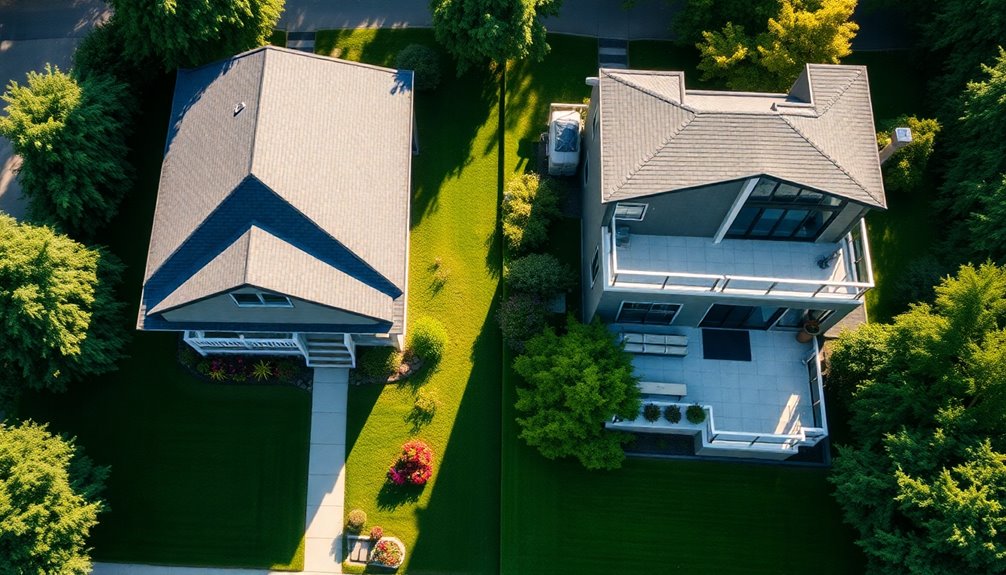
When it comes to design preferences, personal taste plays an essential role in deciding between a bungalow and a two-storey house.
Bungalows typically feature an open concept design that enhances movement and visibility, making them perfect for families with young children. You might appreciate the compact living space that a bungalow offers.
On the other hand, two-storey homes provide varied architectural styles and creative flexibility, allowing for grand staircases that catch the eye. Their layout often separates living areas from bedrooms, which can be great for privacy in larger families.
Ultimately, your choice will depend on whether you value the cozy feel of a bungalow or the expansive nature of a two-storey design. Additionally, the choice may also reflect regional influences in architectural styles, such as the intricate carvings found in Javanese houses.
Accessibility and Mobility

Choosing between a bungalow and a two-storey house often hinges on accessibility and mobility needs. Bungalows provide a significant advantage, especially for those with mobility challenges. Without stairs, moving around is much simpler and safer.
Here are a few reasons why bungalows might be the better choice:
- Single-level living: Ideal for aging residents, bungalows eliminate the risk of falls associated with stairs.
- Multi-generational compatibility: Families can easily accommodate different mobility needs without worrying about stair access.
- Future-proofing: As mobility needs change, bungalows offer adaptable living spaces that can grow with you.
In contrast, two-storey houses may require costly modifications like elevators, making bungalows a more practical option for accessibility. Additionally, establishing a bedtime routine can be easier in a single-level home, allowing families to manage daily tasks more efficiently.
Frequently Asked Questions
What Are the Disadvantages of a Bungalow?
When considering disadvantages of a bungalow, you might find that they often require larger plots of land, leading to higher taxes.
Their expansive roof can mean more significant maintenance costs, too.
You may also notice limited privacy since all spaces are on one level, making it easier to see into different areas.
Additionally, if you plan to expand, bungalows can restrict your options, especially on smaller lots.
Why Do People Prefer Bungalows?
You might prefer bungalows for their mobility-friendly design, making it easier to navigate spaces without stairs.
The open concept layout enhances visibility, perfect for keeping an eye on kids.
Plus, bungalows allow for quick expansions as your family grows, saving you time and money.
Lower utility costs and added privacy from landscaping make them economical and serene.
What Is the Disadvantage of a Two Story House?
A two-story house can come with several disadvantages.
You might face higher construction and maintenance costs due to the extra materials and labor needed.
Stairs can be a real challenge, especially if you or someone in your household has mobility issues.
Plus, heating and cooling can be pricier, as you'll need more energy to keep multiple levels comfortable.
Don't forget about potentially increased insurance rates, which can add to your overall expenses.
Which Type of House Is the Best?
When it comes to choosing the best type of house, you've gotta weigh your options carefully.
Consider your lifestyle, family size, and future plans. If you prefer easy accessibility, a single-level design might suit you best.
On the flip side, if you need more space for a growing family, you might lean towards a multi-level home.
Ultimately, the best choice reflects your personal preferences and long-term needs, so think about what fits your life.
Conclusion
In the end, choosing between a bungalow and a two-storey house really comes down to your lifestyle and needs. Like a well-told fable, each option has its lessons—bungalows offer simplicity and accessibility, while two-storey homes provide space and privacy. Consider what matters most to you, whether it's expansive views or easy maintenance. Ultimately, your choice should reflect not just a roof over your head, but a sanctuary that feels uniquely yours.



